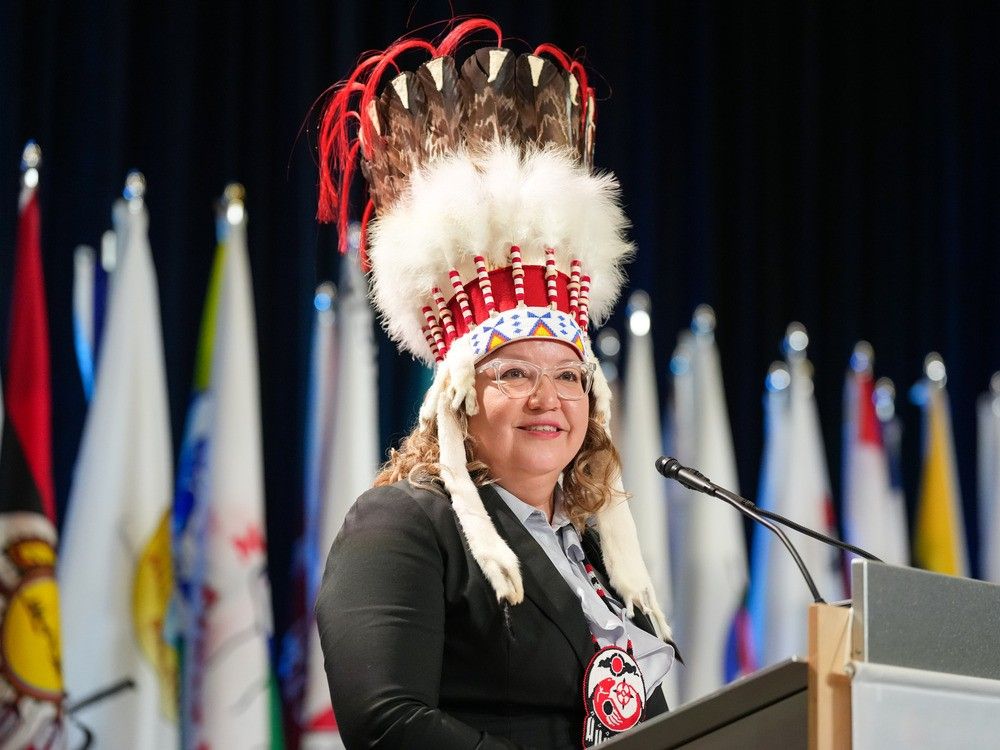
OTTAWA — Prime Minister Mark Carney’s legislation to fast-track projects deemed in the national interest is expected to be tabled in the House of Commons in a matter of days but is already facing some resistance from the Assembly of First Nations.
In a letter to Carney dated May 30, AFN National Chief Cindy Woodhouse Nepinak wrote that the proposed bill, in its current form, “suggests a serious threat to First Nations exercise of Treaty rights, inherent rights, title and jurisdiction.”
Woodhouse Nepinak insisted First Nations’ “free, prior and informed consent” must be obtained before any major infrastructure and energy projects move ahead.
“Otherwise, this legislation like so many before it, will become (mired) in conflict and protracted litigation, because First Nations rights have once again been ignored,” she wrote in an apparent warning to the newly elected prime minister.
Carney told reporters after the meeting he had a series of meetings with Indigenous leaders in the lead-up to Monday’s rendez-vous with premiers and said there would be more consultations moving forward. He also said he would be meeting again with the AFN in mid-July in Winnipeg.
Woodhouse Nepinak was asked to weigh in on the proposed legislation by senior officials of the Privy Council Office (PCO), who sent her a letter dated May 23.
“Now more than ever, the future of Canada’s economy depends on a collaborative and coordinated approach among federal, provincial, territorial and Indigenous governments,” wrote Christiane Fox, deputy clerk, and Mollie Johnson, deputy secretary to the cabinet.
Carney
held a first ministers’ meeting in Saskatoon on Monday
to discuss plans to knock down provincial trade barriers and fast-track national projects. He
also met with oil and gas executives
, as well as Indigenous leaders, over the weekend about those plans.
Fox and Johnson said the “One Canadian Economy” legislation is expected to be tabled in early June. It will not only include a framework to remove federal barriers to internal trade but provide faster regulatory approval for projects through a new office for major projects.
According to last week’s speech from the throne, the government expects the time needed to approve projects to be reduced from five years to two through the creation of this new office, all while upholding Canada’s “Constitutional obligations to Indigenous peoples.”
The government also vowed to strike co-operation agreements “with every interested province and territory within six months to realize its goal of ‘one project, one review.’”
In their letter, the senior PCO officials asked Woodhouse Nepinak to provide the AFN’s comments by May 30, which she did.
“We understand the timelines are accelerated, but immediate cooperation is required to secure our national interests,” wrote Fox and Johnson.
Woodhouse Nepinak met with Carney on Thursday to discuss the proposed legislation.
She told National Post in an interview that while the organization supports efforts to better protect Canada’s economy against uncertainty coming from the U.S., “First Nations are very concerned that this federal proposal has the potential to violate many collective rights of First Nations, respecting our lands, waters, resources, inherent title rights.”
Woodhouse Nepinak said they need to see the full draft of the proposed legislation to fully analyze it. “We’re concerned because First Nations need to have the time to analyze it, to review it legally,” she said.
She said giving the AFN a “seven-day window” to respond to the proposal when all they received were “pieces” is “so unacceptable.”
“It cannot trample over First Nations’ inherent treaty rights, and they need to make sure that they’re having a conversation with First Nations across the country and not just the AFN.”
Woodhouse Nepinak said the federal government needs to focus on dealing with the infrastructure on First Nations reserves and the issue of insufficient housing, schools and clean drinking water in communities. “Let’s fast-track schools, why don’t we talk about that?”
Asked whether she believes the legislation will be challenged in the courts, Woodhouse Nepinak said: “I’m just going to say that First Nations will do whatever they need to do to protect our rights and our inherent rights in this country, and we won’t be trampled on.”
The Federation of Sovereign Indigenous Nations (FSIN), which represents 74 First Nations in Saskatchewan, complained about being excluded from the first ministers’ meeting. The FSIN was, however, invited to a meeting on Sunday, which it attended.
“The Prime Minister and Premiers will be making decisions about our traditional territory without our voices at the table despite the fact Saskatchewan is First Nation ancestral and traditional lands,” said FSIN Chief Bobby Cameron in a press release.
“This continues the colonial pattern of excluding First Nations from decisions that directly affect our people and our lands.”
Nunavut Premier PJ Akeeagok told reporters before the meeting that many of the “nation-building projects” that would be discussed are initiatives from Indigenous groups.
He said the four projects in Nunavut that he is pushing for are being led by the Inuit.
“So, they are coming here to the table through the solutions they’ve pushed forward, and I feel very honoured to be able to advance and push and support these major projects.”
National Post
calevesque@postmedia.com
staylor@postmedia.com
Our website is the place for the latest breaking news, exclusive scoops, longreads and provocative commentary. Please bookmark nationalpost.com and sign up for our newsletters here.
